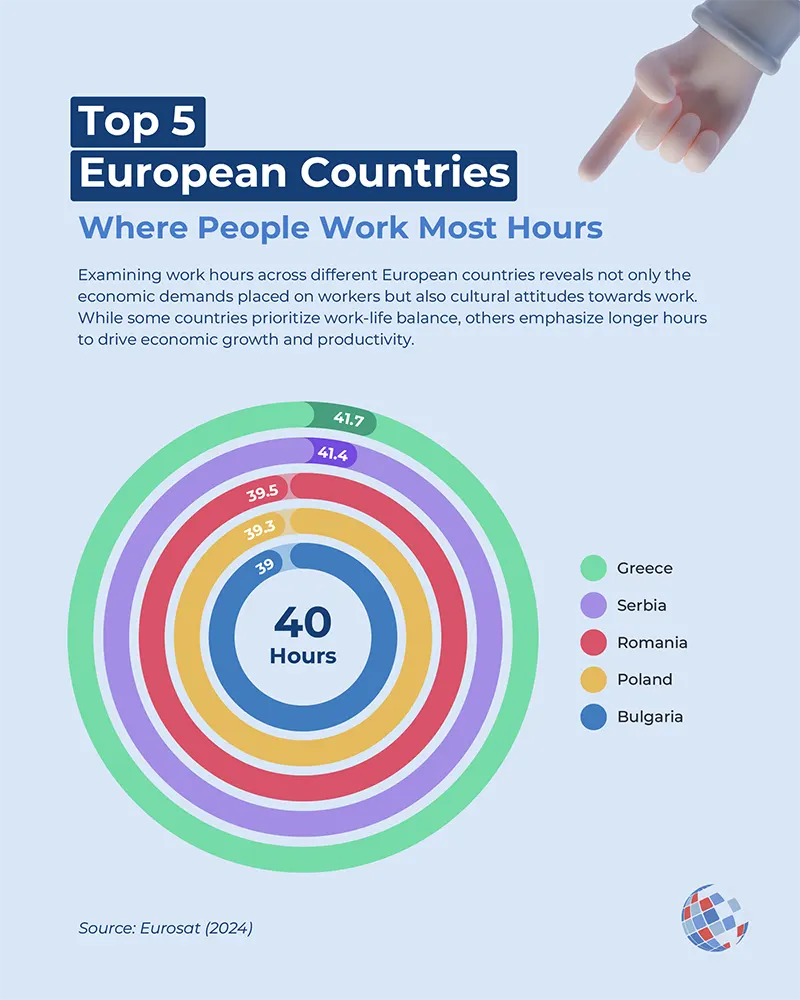Examining work hours across different European countries reveals not only the economic demands placed on workers but also cultural attitudes towards work. While some countries prioritize work-life balance, others emphasize longer hours to drive economic growth and productivity.

Tired of scrolling? Download a PDF version for easier offline reading and sharing with coworkers
Top 5 European Countries Where People Work the Most Hours

Average Work Time in the EU
In 2023, the average working week for individuals aged 20-64 in the European Union (EU) was 36.1 hours. This average, however, masks significant differences between countries, where work hours can vary widely due to diverse economic activities, labor laws, and cultural attitudes.
Countries with high economic demands and less stringent labor regulations often see longer work weeks. Understanding these differences provides a comprehensive view of how labor forces are managed and the socio-economic factors at play across Europe.
5. Bulgaria (39.0 Hours)
Bulgaria records an average working week of 39.0 hours. Known for its diverse economy, Bulgaria excels in sectors such as energy, mining, metallurgy, and agriculture. The country boasts a GDP of approximately $80 billion. Despite facing some economic challenges, Bulgaria’s unemployment rate in 2024 is expected to be around 5.7%.
Prominent growth industries include information technology and outsourcing services, driven by a skilled workforce and competitive operating costs. Bulgaria’s strategic location and investment incentives make it an attractive destination for businesses looking to expand in Eastern Europe.
Learn more about expanding into Bulgaria with our in-depth EOR guide.
4. Poland (39.3 Hours)
Poland, with its rapidly growing economy, averages 39.3 work hours per week. The Polish economy thrives on manufacturing, mining, and agriculture, contributing to a GDP of about $660 billion. In 2024, Poland’s unemployment rate was projected to be a low 3.2%, reflecting a healthy job market.
Key growth sectors include information technology, automotive, and renewable energy, supported by government initiatives and investments. Poland’s business-friendly environment and skilled labor force position it as an ideal location for companies aiming to expand in Central Europe.
Learn more about expanding into Poland with our in-depth EOR guide.
3. Romania (39.5 Hours)
Romania reports an average working week of 39.5 hours. The Romanian economy is diverse, with significant contributions from industries such as automotive, information technology, and agriculture, resulting in a GDP of approximately $300 billion. The unemployment rate in Romania is expected to remain around 4.7%, indicating a stable job market.
Emerging sectors for growth include renewable energy and technology, driven by substantial foreign investments and a skilled workforce. Romania’s strategic location and dynamic economic environment make it an attractive destination for international businesses.
Learn more about expanding into Romania with our in-depth EOR guide.
2. Serbia (41.4 Hours)
Serbia has one of the longest working weeks in Europe, averaging 41.4 hours. The Serbian economy is driven by manufacturing, energy, and mining industries, contributing to a GDP of about $65 billion. In 2024, Serbia’s unemployment rate was expected to be approximately 9.3%, reflecting ongoing economic reforms and development efforts.
Key growth sectors include information technology and telecommunications, supported by government initiatives and investments. Serbia’s strategic location and improving business climate offer significant opportunities for businesses considering expansion in the Balkans.
Learn more about expanding into Serbia with our in-depth EOR guide.
1. Greece (41.7 Hours)
Greece tops the list with the longest average work week of 41.7 hours. Known for its rich history and diverse economy, Greece excels in tourism, shipping, and agriculture, contributing to a GDP of about $230 billion.
The country’s unemployment rate in 2024 was expected to be around 12.8%, reflecting ongoing economic recovery efforts. Key industries for growth include renewable energy and technology, driven by substantial EU funding and national investments. Greece’s favorable climate for innovation and strategic location make it an appealing destination for businesses looking to expand their operations.
Learn more about expanding into Greece with our in-depth EOR guide.
Expand into Europe with INS Global
Expanding your business into Europe offers an unparalleled opportunity to access diverse markets and a highly skilled workforce. However, navigating the complex labor laws and regulatory requirements of each country can be challenging. INS Global provides comprehensive Employer of Record (EOR) services to streamline this process.
Partnering with INS Global ensures that your business remains compliant with local labor laws, manages payroll and taxes efficiently, and handles employee benefits seamlessly. Our expertise in European markets allows you to focus on your core business operations while we take care of the administrative and legal complexities.
Let INS Global be your trusted partner in international expansion. Contact us today to learn how our EOR services can help you successfully establish and grow your presence in Europe.

SHARE